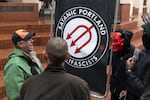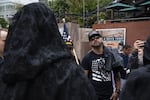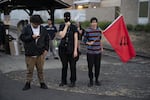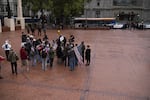On a drizzly Portland day this past September, members of Vancouver-based Patriot Prayer gathered at Portland’s Pioneer Square for what they called a prayer march.
About 30 of the members were greeted by a handful of counterdemonstrators, a contingent of Satanic Portland Antifascists among them.

A Patriot Prayer marcher yells at members of the Satanic Portland Antifascists during a Patriot Prayer march on Sept. 15, 2019 in Portland's Pioneer Square.
Jonathan Levinson / OPB
Members sporting helmets and video cameras documented the verbal sparring. One Patriot Prayer member told a black counterprotester to “go back to Africa.” The occasional passerby yelled for them to “go back to Washington” or “no one wants you here.”
Patriot Prayer is a far-right group that has attracted racist and violent followers. The group is similar to the more well known Proud Boys, another violent extremist group.
For the past three years, scenes like this have played out nationally as groups have made a habit of holding conservative rallies in mostly liberal cities – Portland, Berkeley, New York and many others.
Law enforcement, meanwhile, has struggled at times to contain violence that can occur at those rallies, and has faced criticism for being friendly with far-right groups. But even as Portland and other police departments have brought more charges against people who engage in street fights, it's not clear if they alone can quell political violence occurring across the country.

Patriot Prayer leader Joey Gibson argues with members of the Satanic Portland Antifascists during a Patriot Prayer march on September 15, 2019 in Portland's Pioneer Square.
Jonathan Levinson / OPB
As recently as Sunday, Proud Boys members were videotaped grappling with and punching a person on an overpass in Portland.
Portland in particular has been a leading example of how law enforcement has struggled to grapple with toxic political discourse playing out in the streets. Every few months since 2017, the city has grabbed national attention as far-right groups and counterprotesters throw milkshakes, douse each other with bear spray or engage in street fights.
“I think early on in these events ... there wasn't necessarily a priority or emphasis on working those cases post protest,” said Lt. Franz Scheoning, the commander of the Portland Police Bureau’s Rapid Response Team.
Schoening said in the early protests, cases that arose were assigned to detectives who had a regular case load, so misdemeanor assaults or harassment were low priority when compared with regular cases they worked, like felony assaults or sex crimes. But as the police bureau learned more about the nature of these street clashes, they changed their approach.

A Patriot Prayer marcher punches an antifa activist after the activist threw a soda at him during a Patriot Prayer rally on September 15, 2019 in Portland's Pioneer Square.
Jonathan Levinson / OPB
“I think it took us a while to realize that these events were ... cumulative,” Schoening said. “If there wasn't an arrest made or an investigation and arrest done post event, it added fuel to the fire so that the next event was even worse.”
And as those events got worse, law enforcement started to respond to a public demand that street violence be taken seriously. In October 2018, there was something of a turning point in New York. Nearly a dozen Proud Boys assaulted a handful of antifa protesters there, but this time law enforcement took the political violence more serious.
Ten Proud Boys were eventually arrested. Some have received years in prison. At one sentencing hearing, State Supreme Court Judge Mark Dwyer explicitly referenced the unique threat political violence poses to society.
“I know enough about history to know what happened in Europe in the '30s when political street brawls were allowed to go ahead without any type of check from the criminal justice system,” Dwyer said.
Oren Segal, director of the Anti-Defamation League’s Center on Extremism, isn’t confident prosecuting extremists will completely stop the violence.
“Is it possible that arrests may mean that less milkshakes may be thrown or fewer Proud Boys will go seek out a fight during an event?” Segal said. “I mean, it's possible.”

Antifa demonstrators wait for a vigil for migrants who have died in ICE custody to begin in front of the Portland ICE office on July 17, 2019 in Portland, Oregon.
Jonathan Levinson / OPB
But arrests may not be entirely effective because the clashes aren’t a byproduct of the demonstrations, he said. The clashes have become the reason for the demonstrations.
“It's no longer just a pro-Trump rally or a free speech rally,” Segal said. “They're now having rallies literally in opposition to those that they know will show up and oppose them.”
Schoening said there are other dynamics at play that exacerbate the violence. The groups, on the surface, support the police and say they want to work with them to keep an event safe. But, he said, the dynamic is more complicated than that.
“One group is using the police to stand behind and engage in inflammatory rhetoric knowing that if they don't assault the police, chances are they're gonna provoke the other side into assaulting the police and causing the police to take actions,” Schoening said.
That dynamic might explain why, until recently, most of the arrests at Portland demonstrations had been antifa protesters charged with low level offenses.
Provoking counterprotesters also plays well online and helps feed a victimization narrative, according to Segal.
“So when antifa throw stuff at them ... Proud Boys and Patriot Prayer are able to say, 'See, they are trying to silence us and stop our freedom of speech,'” he said.
The camera-toting, Facebook livestreaming far-right agitators at these demonstrations speak to how important social media is for their movement. They feed off the YouTube videos and Facebook likes. Schoening, the Portland police officer, said when their events capture the attention of the national news media — such as when right wing writer Andy Ngo was attacked in Portland — turnout and volatility for the next event can be even higher.

A far-right activist live streams verbal fights anti-ICE demonstrators in front of the Portland ICE office on July 17. 2019 in Portland, Oregon.
Jonathan Levinson / OPB
“I think that when the event becomes a spectacle and the media focuses their attention on it, it drives some of the level of the rhetoric we see at those events,” he said.
This year, Portland law enforcement followed New York’s lead in bringing stronger criminal charges against members of groups like the Proud Boys and Patriot Prayer.
After 2019 May Day demonstrations, Patriot Prayer leader Joey Gibson led his group to a Portland bar, where they engaged in a street fight. It was like many of the fights before it — but this time, prosecutors pursued felony riot charges against Gibson.
Adding to his legal woes, the bar owner filed a $1 million civil suit against him, and this month an attorney filed another federal civil rights lawsuit against Gibson for his part in a violent 2017 protest at Evergreen College in Washington.
Proud Boy and former Patriot Prayer brawler Tusitala “Tiny” Toese is also facing felony and misdemeanor assault charges for a 2018 attack in Multnomah County.
Despite facing millions of dollars in damages and as much as five years in prison, Gibson said he’s undeterred.
“I haven’t seen things get harder for me. I have seen more support from people seeing how serious this is,” he said. “I’ll get like 3,000 extra subscribers the day that I get charged.”

Patriot Prayer marchers and antifascist counterprotesters argue during a Patriot Prayer march on Sept. 15, 2019 in Portland's Pioneer Square.
Jonathan Levinson / OPB
Segal said even though more charges are being brought against group members, the rhetoric being used online and in-person at protest events is still divisive and pervasive. It’s in our political discussion, on our TVs, in our social media, and in public spaces.
Segal said he places much of the responsibility for ending political violence on our political leaders, not the police.
“I don't think it's unreasonable to have that expectation that those who are leading the public discussion model good behavior,” Segal said.
But until then, he said, it’s going to be on law enforcement to hold back the deluge.
